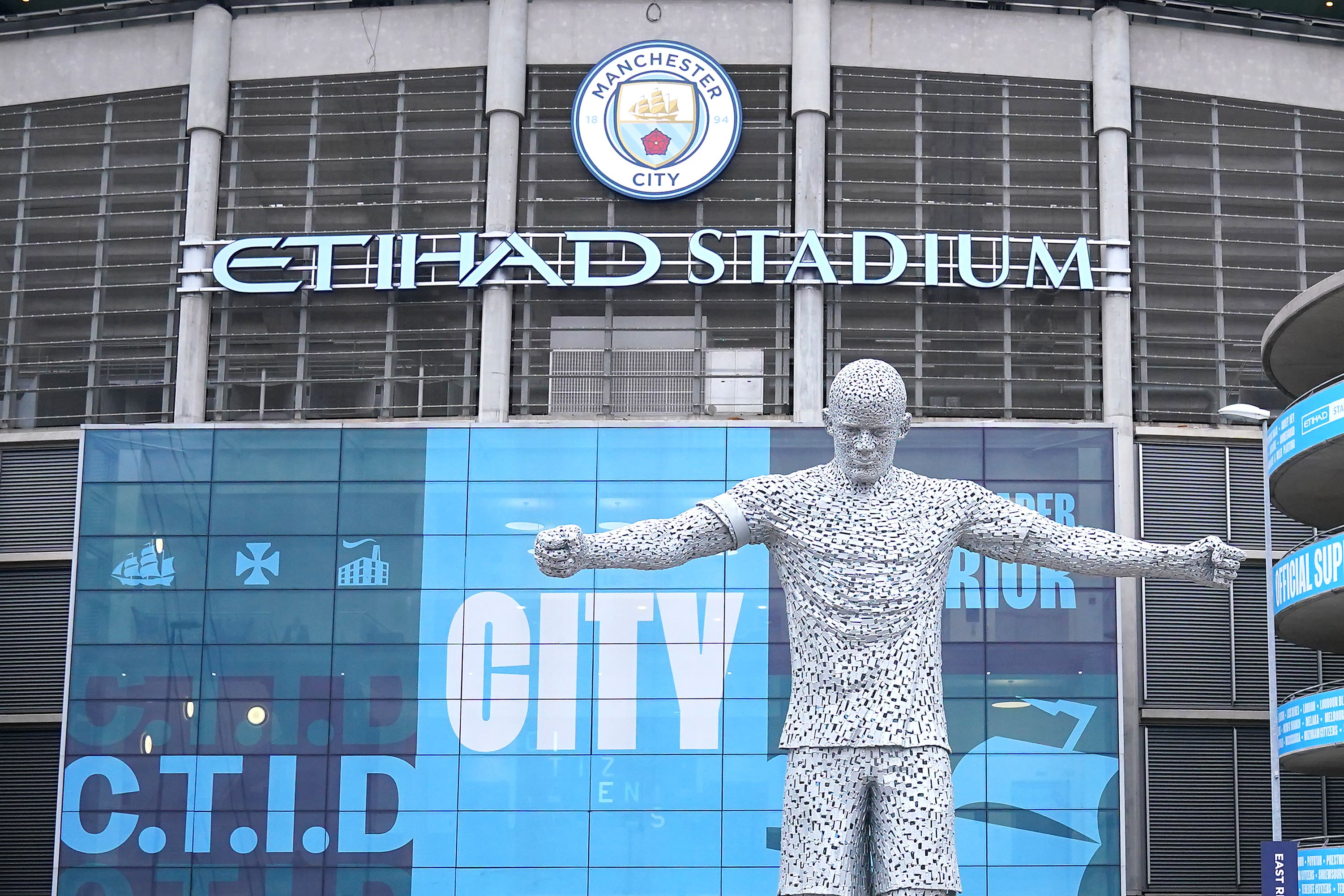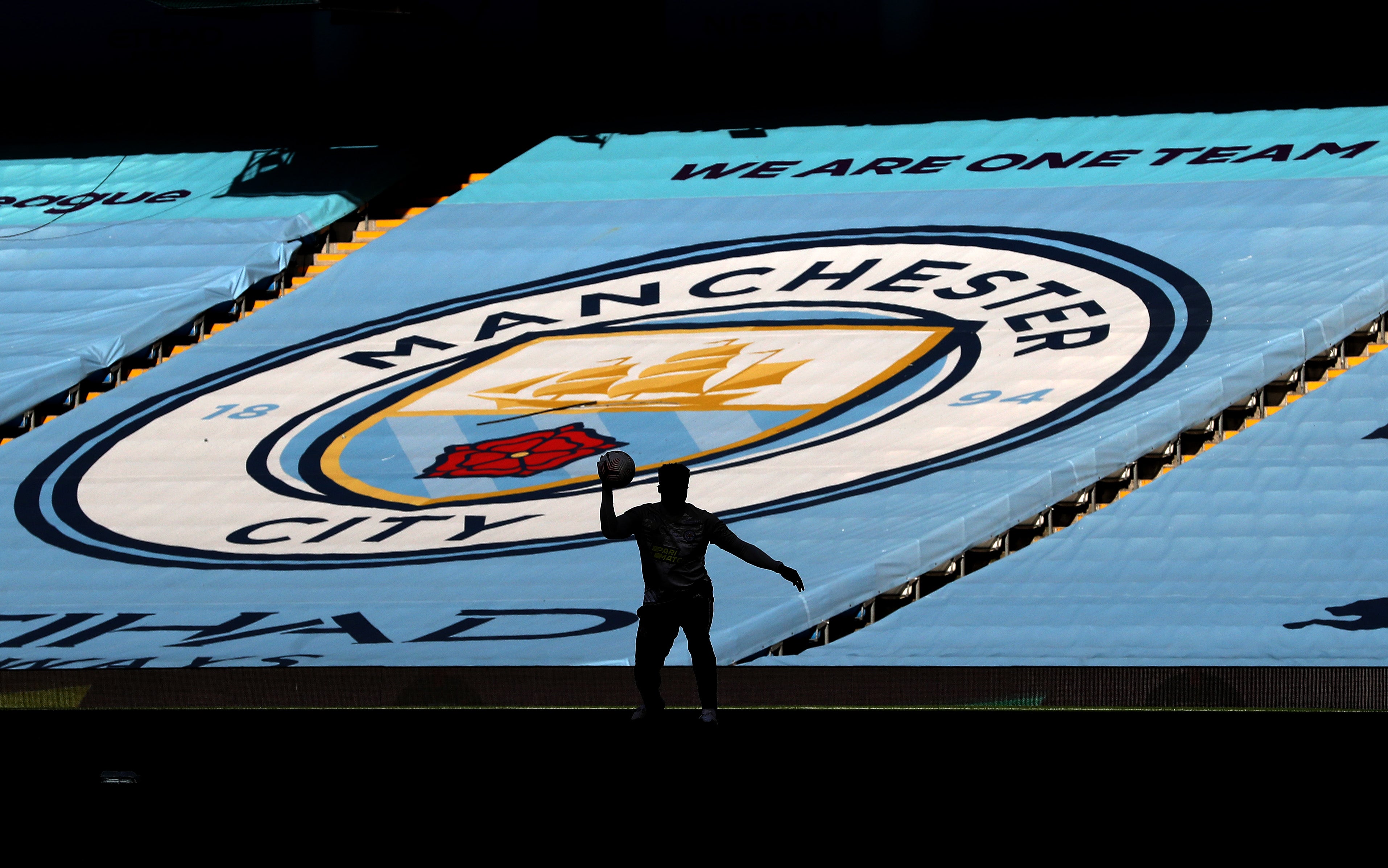Man City financial investigation raises old questions and prospect of Champions League ban
The Premier League investigation into City’s alleged financial breaches has spotlighted fresh questions arising from Uefa’s previous case against the club
Your support helps us to tell the story
From reproductive rights to climate change to Big Tech, The Independent is on the ground when the story is developing. Whether it's investigating the financials of Elon Musk's pro-Trump PAC or producing our latest documentary, 'The A Word', which shines a light on the American women fighting for reproductive rights, we know how important it is to parse out the facts from the messaging.
At such a critical moment in US history, we need reporters on the ground. Your donation allows us to keep sending journalists to speak to both sides of the story.
The Independent is trusted by Americans across the entire political spectrum. And unlike many other quality news outlets, we choose not to lock Americans out of our reporting and analysis with paywalls. We believe quality journalism should be available to everyone, paid for by those who can afford it.
Your support makes all the difference.In a slightly alternate world, requiring only a few different developments, Wednesday night’s match against RB Leipzig might have been a landmark event for Manchester City for the wrong reasons. It might well have represented their first Champions League knock-out fixture in three years, had Uefa’s punishment of a two-year ban not been overturned by the Court of Arbitration for Sport in July 2020.
That might even have been the case had the governing body’s response been different.
The “fudge” that the outcome represented – where City were fined £10m for non-cooperation – is reflected in the number of questions that remain about the case, that are being asked again at the top level of football after the Premier League charged the serial champions with over 100 alleged breaches.
Most of all, why did Uefa not appeal the outcome, when sources within the organisation feel they should have? Why did they not open a new investigation when Der Spiegel released a new set of emails, that appeared to contradict some of the evidence given in CAS?
All that could come under further scrutiny since the Premier League’s independent commission relates to the same issues. It is about allegations of fraud, dishonesty and a failure to accurately disclose information, with much of it resting on two core sponsorship deals, and a lot of that information in the first 13 pages of the CAS report.
In the first example, Etisalat – an Emirati telecommunications company – had a deal with the club from 2012 onwards. By City’s own admission, however, the club’s owner – Sheikh Mansour bin Zayed al-Nahyan of the Abu Dhabi ruling family – did arrange payments understood to total £30m on behalf of Etisalat through his company Abu Dhabi United Group [ADUG] for sponsorship in 2012 and 2013. The telecoms company didn’t actually pay anything until 2015. City hadn’t even concluded a contract with Etilasat until that year but agreed one in principle. The payments were nevertheless recorded in City’s financial statements – as provided to the English FA for Uefa’s Financial Fair Play process – as sponsorship.
From this, the members of Uefa’s Club Financial Control Body [CFCB] adjudicatory chamber [AC] considered the two payments to be straightforward funding by the club’s owner. The chamber found that the club’s financial statements had “overstated MCFC’s true sponsorship revenue”. City’s defence against this was that Etisalat had reimbursed ADUG the £30m in 2015, and that these payments were properly accounted for because they were credited against invoices to the telecoms company.
The chamber rejected that argument. One involved figure says: “the lens to look at it through is like City with – as an example – Brother in the 1990s. There would never have been a situation where the club’s owner paid a sponsor. Would they have tried it with Nike or Puma?”
City put the argument forward again at CAS, where it was decided by 2-1 that this example would not be considered because the alleged breaches were time-barred. That was despite the 2012 and 2013 accounts being submitted in 2014 as part of the three-year period for Financial Fair Play consideration, which would have fallen within the five-year period allowed by the CFCB investigatory chamber in May 2019. The CAS panel nevertheless ruled that the relevant dates were when the payments were made so this was timed out.

That decision also ensured that the Etisalat example couldn’t be used to infer the same patterns of behaviour in a similar accusation around a deal with Etihad. for which the only evidence was leaked emails published in Der Spiegel. The documents set out that the Abu Dhabi airline was paying only £8m of sponsorships worth £35, £65m and £67.5m from the 2012-13, 2013-14 and 2015-16 seasons, respectively, with the rest coming from ADUG. The emails were deemed not sufficient to find Manchester City guilty without the inference from the Etisalat case, although CAS outlined how City essentially accepted the emails as genuine.
These decisions inform some of the other questions that have persisted at the top levels of European football.
One is why didn’t Uefa object to City nominating two members of the CAS panel, and the governing body just one, when it is supposed to be one each? In addition to nominating Andrew McDougall QC, the club recommended the panel’s chairman, Portuguese lawyer Rui Botica Santos. This was put to the governing body.
“Uefa has full trust in all arbitrators appointed by the International Council for Arbitration in Sport (ICAS) and who are accordingly on the List of Arbitrators to compose CAS Panels,” a statement read. “The arbitrators in question were all longstanding, prominent and experienced CAS arbitrators. Uefa had no doubts about their independence or impartiality.”
The outcome was also relevant to another question many describe as “a major frustration”, and was put to Uefa by The Independent. Why didn’t the governing body publish their own full judgement from the adjudicatory chamber’s decision in February 2020?
“On the topic of publication, given the CAS decision replaces the CFCB decision of February 2020 it rendered the publication of the CFCB decision moot and it has not been published on the Uefa website, in line with Uefa’s consistent publication policy for decisions overturned by CAS,” Uefa told the Independent. “That said, the CAS decision does set out in detail the reasoning of the CFCB decision.”
One source describes this explanation as “unsatisfactory”. There are then two lingering questions related to the process.
Why did Uefa cease pursuing City’s emails just before the CAS hearing began? This was a development which allowed CAS to rule that City were no longer refusing to submit emails, so that inference could no longer be drawn from that.
Additionally, why did Uefa allow CAS to call new witnesses and evidence when both are against Uefa’s rules?
“Uefa was satisfied with the way the procedure was conducted: for instance the decision was issued within an efficient time frame, a matter that was important for Uefa to secure the integrity and smooth running of its competitions. Indeed, it was imperative to move quickly as Uefa routinely makes every effort to ensure that CAS proceedings related to exclusion are expedited to receive final decisions within the time available. This also aligned with the wishes of the nine Premier League clubs which applied to intervene in the proceedings and were keen that a CAS decision was taken before the start of the 2020-21 season.
“Since the mentioned CAS Award, Uefa has not made any further comments on the matter, taking in particular into consideration the fact that CAS procedures are of a confidential nature: Uefa is therefore not in a position to provide further details concerning the proceedings before CAS.”
The question that figures within the game ask the most, however, is why they didn’t appeal. It has been described as an “absurdity”, illustrating the depth of feeling. This was compounded two weeks after the CAS decision was announced, when Der Spiegel published more leaked emails that could have warranted a new investigation.

The most noteworthy of these related to the evidence given by Simon Pearce, a City board member and a key adviser to the Abu Dhabi elite. He had been asked if he had “ever arranged any payments to be made to Etihad in relation to its sponsorship obligations of Manchester City Football Club?”
Pearce answered: “Absolutely, categorically not.” CAS had made a point in its verdict of stating he “did not strike the panel as being an unreliable witness” and “did not find his testimony to be false”.
Der Spiegel however published an email from December 2013 that showed Pearce writing to Etihad COO Peter Baumgartner from his Executive Affairs Authority email stating how much he had wired to the company for that purpose and what was still owed to the airline.
The Independent have also approached Manchester City and Simon Pearce for comment, with the club pointing re-asserting their stance from the initial story in 2020. A club spokesman said:
“The questions and matters raised by Der Spiegel appear to be a cynical attempt to publicly re-litigate and undermine a case that has been fully adjudicated, after detailed proceedings and due process, by the court of arbitration for sport.
“Manchester City’s policy remains not to comment on out of context materials purported to have been criminally obtained from City Football Group and Manchester City personnel.”
The leaks show the following, and are relevant as regards Uefa's response.
In 2012, a part of sponsorship money coming from Abu Dhabi was booked within the club as “owner investment”. In 2013, Pearce requested CFO Jorge Chumillas put together a summary of ADUG payment obligations and asked they be divided up according to “club direct payments” and “partner supplements”. In one email, Pearce outlines how Etihad only had to pay £8m of the total sponsorship fee of £67.5m.
For the 2013-14 season, Abu Dhabi supplements added up to £92.5m. “We mustn’t show the partner supplement if it is going outside the club,” wrote Andrew Widdowson, head of finance at the time.
In 2014, he and Chumillas discussed money still to be paid by Etisalat and another Abu Dhabi-based sponsor in Aabar. The emails show a differentiation between the amount being paid by ADUG and the sums to be covered by the companies.
“But actually, formally, we want all of these amounts to be paid by Aabar and Etisalat right?” Chumillas wrote.
The response: “Yes if they can.”
These leaks were published within the deadlines for appeal, either to CAS or Swiss courts. Uefa could have done that or, according to one prominent source, “opened a new case on the basis of new evidence”.
Uefa’s response to these questions was: “With regard to the Der Spiegel emails published after the CAS decision, Uefa sought a legal opinion regarding a potential appeal to the Swiss Federal Tribunal. That opinion indicated that the chances of obtaining a ‘request for revision’ was low and that even in the remote chance that it was granted, Uefa would have limited chances of the appeal itself being successful. It is worth remembering that Uefa wrote to Der Spiegel a number of times asking for copies of any information that might be relevant for the case but on each occasion, Der Spiegel answered negatively to these requests.”
There will be many figures within Uefa now watching the Premier League investigation with interest, not least since it could yet have an impact on their competitions. If the alleged breaches are proven, it would mean they should have not got a licence for the Champions League, which could see a penalty reinstated.



Join our commenting forum
Join thought-provoking conversations, follow other Independent readers and see their replies
Comments